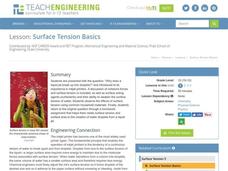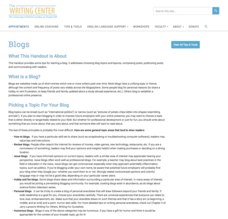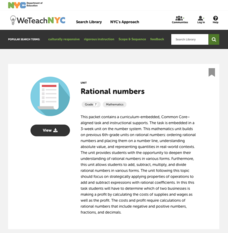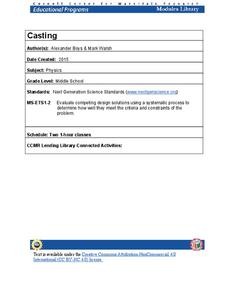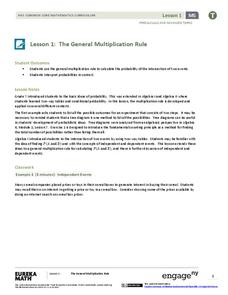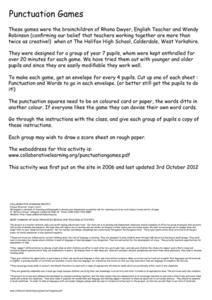Brigham Young University
Understanding Design, Composition, and Color
The set for a play combines design elements (style, line, shape, mass, measure, position, color, and texture) and principles of composition (unity, harmony, contrast, variation, balance, proportion, and emphasis) to create a particular...
Open Oregon Educational Resources
Digital Foundations: Introduction to Media Design with the Adobe Creative Cloud, Revised Edition
How can Adobe Creative Cloud enhance digital art and media design? Readers explore just that with the Digital Foundations eBook. They learn how to source images and how to create symmetry and asymmetry in their digital designs. They also...
Teach Engineering
Surface Tension Basics
Back to the basics (of surface tension). The first installment of a nine-part series teaches young scholars about the basics of surface tension and how it relates to water droplets. They also learn how this concept allows for the...
Discovery Education
Jets in Flight
This Discovery Education activity provides the information needed to understand the basics of flight. Before taking off, young pilots learn the eight stages of the engineering design process. Small groups then design and build...
University of North Carolina
Blogs
The blogosphere may be overwhelmed with content, but there's still room for unique points of view. Creating a blog that stands out, however, is the bigger challenge. A handout on blogs, part of a series of handouts on specific writing...
Institute of Electrical and Electronics Engineers
Rotational Equilibrium
Physics stars design mobiles that demonstrate rotational equilibrium. They take measurements and solve related equations for force by graphing, substitution, or determinants. This is a well-developed lesson plan, complete with student...
Texas Education Agency (TEA)
Geometry in Architecture #1
Discover how to analyze architecture from a geometric standpoint. The fourth installment of an 11-part unit on architecture first provides a presentation on axis, balance, basic form, formal, pattern, proportion, symmetry, and tripartite...
New York City Department of Education
Rational Numbers
Order up a unit on rational numbers. A unit overview gives a basic outline of instruction and activities on rational numbers for the 7.NS domain. A performance task on profits at pizzerias assesses understanding of the concepts in the...
PBS
Constitution Day
September 17, Constitution Day so named because that was the day in 1787, that 39 men signed the Constitution, is the focus of a series of activities designed to simulate a Constitutional convention and open a study of the US Constitution.
Teach Engineering
Fun Look at Material Science
Introduce materials science with a class demonstration. After showing a PowerPoint presentation on materials and their properties, instructors provide a ceramic tile, a Popsicle stick, a paper clip, and a plastic bag as examples of...
Cornell University
Casting
Don't cast a great hands-on resource aside! Scholars learn about the process of casting by actually trying out an example. Plaster of Paris and cookie cutter molds help them complete the activity.
University of Arkansas
Assessment and Discussion
"Without concerned citizen action to uphold them (human rights) close to home; we shall look in vain for progress in the larger world. . ." Eleanor Roosevelt's comment is used to set the stage for the conclusion of a five-lesson unit...
National Sailing Hall of Fame
How a Sailboat Works: Hull Speed and Buoyancy
How can you determine the maximum speed of a sailboat? A sailing presentation included with a straightforward lesson plan prompts learners to calculate the maximum speed of a sailboat with a displacement hull. The...
National Endowment for the Humanities
Ratifying the Constitution
Ratifying the Constitution was no simple task. Using primary sources, such as classic writings from the Federalists and Anti-Federalists, young scholars examine the arguments for and against the Constitution. They then decide: Would they...
American Statistical Association
Exploring Geometric Probabilities with Buffon’s Coin Problem
Scholars create and perform experiments attempting to answer Buffon's Coin problem. They discover the relationships between geometry and probability, empirical and theoretical probabilities, and area of a circle and square.
Dick Blick Art Materials
Monoprinting with Washable Markers
Introduce young children to printmaking with with an activity that used washable markers to produce one, unique monoprint.
EngageNY
The General Multiplication Rule
In the first installment of a 21-part module, scholars build on previous understandings of probability to develop the multiplication rule for independent and dependent events. They use the rule to solve contextual problems.
Collaborative Learning Project
Punctuation Games
It might not be "Conjunction Junction" but your school room will rock with this punctuation game. Game rules, templates, and background information are all included in the packet.


